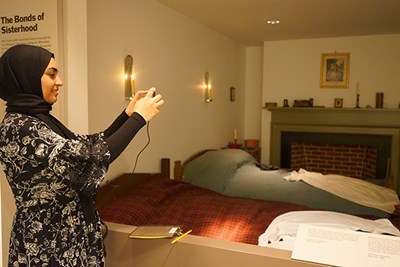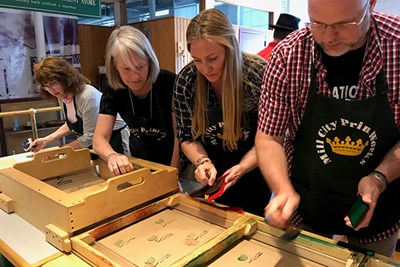Workshop Is Supported by Google Education, NSF
 Image by Edwin L. Aguirre
Image by Edwin L. Aguirre
Middle-school teachers from Massachusetts, Connecticut, New Hampshire, Rhode Island and Maine participated in the CS Connections workshop held in August on North Campus.
08/21/2018
By Edwin L. Aguirre
Middle school students love their smartphones. So, to spark interest in computer programming, Dean Gaudet is planning to introduce MIT App Inventor – an intuitive, visual programming tool for mobile devices – to his classes this fall so that students can create their own phone apps.
Gaudet, who teaches computer technology to students in grades 5 to 8 at the Comprehensive Grammar School in Methuen, learned about App Inventor at “CS Connections,” a four-day summer workshop on North Campus conducted by Prof. Fred Martin of the Department of Computer Science. Gaudet is one of 50 middle school teachers from across New England who participated in the meeting to learn about computer science.
“The workshop was intended for teachers who haven’t taught computer science before. Our emphasis was on encouraging them to make connections between computer science and their subject areas and to integrate computer science into their teaching practices and curricula,” said Martin, who is the associate dean for student success at the Kennedy College of Sciences and chair of the Computer Science Teachers Association’s board of directors.
The event is supported with a $25,000 grant from Google Education, along with additional funding from the National Science Foundation’s “Expanding Computing Educational Pathways” project.
 Image by Edwin L. Aguirre
Image by Edwin L. Aguirre
Kelly Graveson Payne of Douglas Middle School, left, and Sheila Slawiak of Springfield Public Schools (both in Massachusetts) are shown collaborating on a project.
Introducing New Technologies
The event featured talks by a panel of UMass Lowell CS alumni who shared their career paths and job experiences with the teachers. The panelists included Rajia Abdelaziz ’16, inventor of invisaWear, Kaitlyn Carcia ’15 and Jeremy Poulin ’14, ’16 of Red Hat, Hassan McKusick of ART19, Inc., and Patrick Son ’17 of Profitect, Inc.
Aside from App Inventor, the teachers were also introduced to MIT Scratch, a programming language and online community where users can create and share interactive stories, games and animations, and to BBC micro:bit, a miniature programmable computer for creating electronics, e-textile and robotics projects and activities.
“The workshop had been incredibly useful. It was really great to learn about new technologies and learn from teachers who have integrated them into their classrooms, so I’m really excited,” said Clara Cahill, who teaches eighth-grade science at Butler Middle School in Lowell.
 Image by Edwin L. Aguirre
Image by Edwin L. Aguirre
For Gaudet, CS Connections has been a very positive experience.
“We were able to work on projects individually and as a team, and the motivation was extremely high. Everyone was interested in what we are doing,” he said.
Gaudet added, “We thank UMass Lowell for hosting this workshop. The college students and instructors had been a tremendous support to us teachers. And the alumni speakers were very impressive – it was amazing to see how far these young professionals have gone in such a short period of time and being able to pursue their dream jobs.”
“Compared to all other disciplines, computer science is a young field, and it’s still becoming established – especially in the K–12 level,” Martin noted. “Teachers who want to teach computer science desperately need a community; they are usually the only ones in their school teaching it. That’s why face-to-face events like CS Connections are so powerful. Teachers learn from each other and establish lasting collegial relationships to support each other in their teaching practice.”


